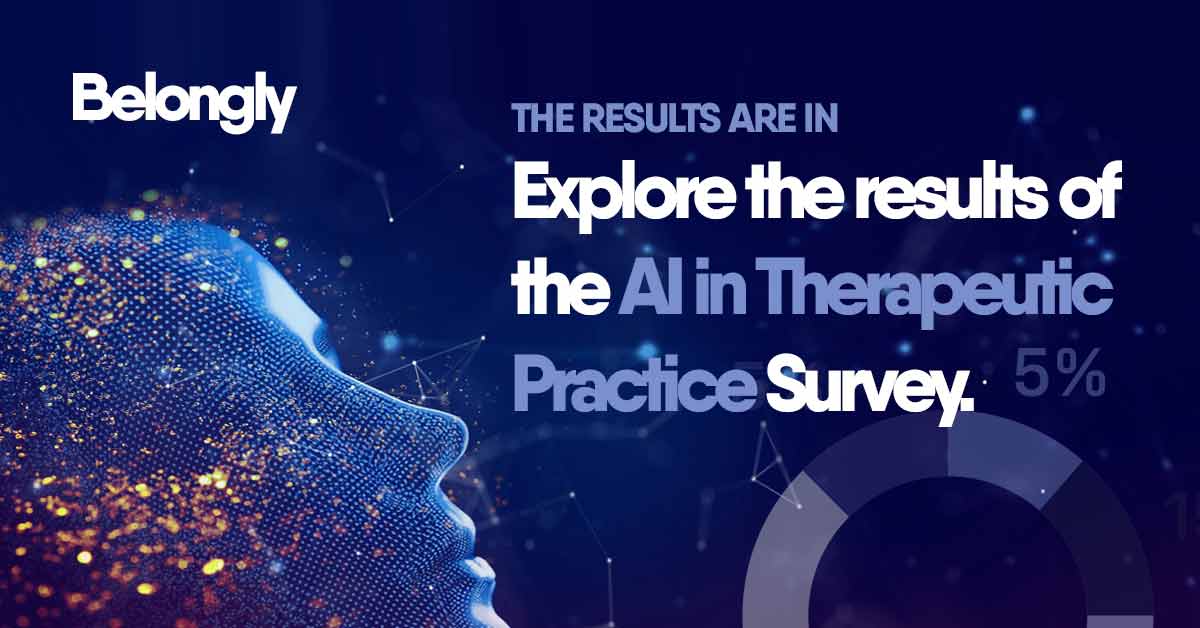Results from the Belongly 2023 AI In Therapeutic Practice Survey

How Many Years Have You Been Practicing Therapy?
Most respondents appear to be veterans of the mental health industry, with the top response being more than 10 years of working as a mental health professional.
Where are you located?
Respondents were located nationwide, with the primary group responding from California. This was purely circumstantial.
Do you currently use AI in your practice?
Only a small number of respondents report using AI in their practice, with another fraction currently thinking about it. Finally, a majority of therapists indicate they do not use AI in their practice.
If AI knowledge and skills were not a barrier, do any of these AI uses seem appealing in your practice?
When presenting different scenarios of how AI can be implemented, many respondents seemed open to at least thinking about the ways AI could be advantageous to their business.
What are the reasons you’re not currently using AI?
Concerns remain. Ranging from ethical boundaries to a lack of understanding. The reasons were closely split among the options for not using AI.
Have any of your clients reported using AI for therapeutic purposes?
A small percentage of respondents have reported knowledge of their clients using AI in between sessions.
How are your clients using AI?
Only a small percentage of therapists reported their clients use AI as a virtual therapist between sessions. Will this number grow over time?
Do you believe AI can ever replace the job of a therapist?
Most respondents do not believe AI will replace their jobs.
Which of these options is your top concern about AI?
Ethics is the primary concern about AI in therapeutic practice as of this survey. (July 2023)
Which of these excites you the most about AI in therapy?
Therapists remain intrigued about the possibility of AI in their business.
Which of these emotions best represents how you currently feel about AI?
While many respondents remain curious, there’s still a collection of fear and concern. Will this abate over time? As with any new technology, will fears fade and lead to mass adoption in the mental health industry?
What is the extent of your knowledge about AI?
Knowledge and experience is limited but growing, with only a small percentage of respondents reporting they feel well-educated about AI, as of July 2023.
Conclusions
Survey says: On the AI front, belongly.com’s mental health experts are open-minded but aren’t letting down their guard. Hundreds of vetted clinicians nationwide have weighed in, most boasting some serious tenure in the field. While the rest of the professional world is riding the AI wave, 72% of you openly opt-out regarding AI in your practice. It’s not that you’re missing the allure—oh, we get it, the dream of neatly organized client files and effortless elevated care is tempting, but not nearly enough to overlook the thick ethical fog ahead.
With only roughly 8% of us recognizing our clients even dabbling in digital AI waters, it’s pretty clear we’re not writing ChatGPT prompts into treatment plans yet. The biggest roadblock appears to be ethical concerns, clocking in at 29.51%, followed closely by schedule constraints driving only intentional and strategic time investments. Let’s face it: this isn’t a field for trial and error—especially when time is our most precious currency.
Armed with shared insights, it’s loud and clear that we’re navigating AI mindfully, ensuring we cherish the irreplaceable human connection in our work. While 91% of us harbor ethical concerns in the changing digital landscape, it underscores that we still wear the badge of healer first, never compromising quality for convenience. Through meaningful conversations around AI, we’ve yet again illuminated what makes the Belongly community exceptional—our collective action transforms the concept of belonging into lived experience.



